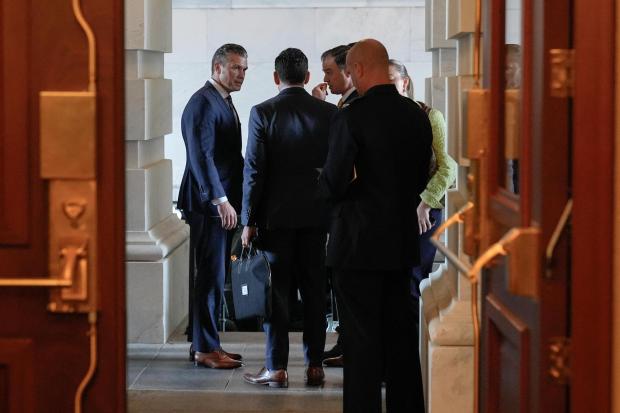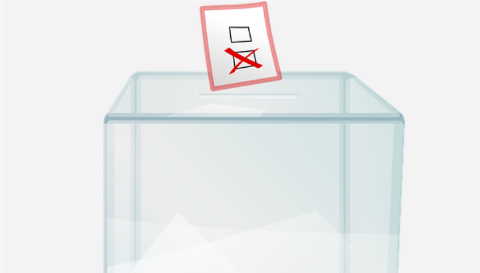By STEPHEN GROVES and MATT BROWN, Associated Press
WASHINGTON (AP) — Top Trump administration officials briefed a small group of congressional leaders Wednesday on the growing military campaign to destroy alleged drug-smuggling vessels in the waters off South America, providing one of the first high-level glimpses into the legal rationale and strategy behind the strikes.
Secretary of State Marco Rubio and Defense Secretary Pete Hegseth met with a bipartisan group of lawmakers who oversee national security issues for roughly an hour in a secure facility in the Capitol.
Republicans emerged either staying silent or expressing confidence in President Donald Trump’s campaign, which has killed at least 66 people in 16 known strikes in the Caribbean Sea and eastern Pacific Ocean.
Democrats said Congress needs more information on how the strikes are conducted and the legal justification for actions that critics say violate international and U.S. law by killing alleged drug smugglers on the high seas.
“What we heard isn’t enough. We need a lot more answers. And I am now asking for an all senators briefing on this issue,” Senate Democratic leader Chuck Schumer said as he left the meeting.
The briefing occurred the day before senators are expected to vote on a resolution that would require congressional approval for any strikes directly on Venezuela.
The Trump administration has provided a trickle of information to Congress since it began destroying vessels in the Caribbean two months ago, but outside of a few classified briefings, much of the information has come from informal talks with members of Trump’s Cabinet and other officials. Despite Congress’ constitutional responsibility to authorize the use of war powers, the administration has sidestepped lawmakers and declared that members of drug cartels are unlawful combatants that it can kill as terrorists.
At the same time, the U.S. military is building up its naval force off South America, raising the specter of an invasion of Venezuela and the prospect that Trump is trying to depose President Nicolás Maduro, who faces charges of narcoterrorism in the U.S.

What lawmakers learned
The classified briefing was open to the top leaders of both parties in the House and Senate, as well as the Republican chair and ranking Democrat for the committees in both chambers that oversee the military, U.S. intelligence and foreign relations. The Trump administration also made available to senators this week the document in which it explains the legal basis for the campaign.
While lawmakers are not allowed to disclose the details of the briefing, they described it in broad terms.
Sen. Jim Risch, the Republican chair of the Senate Foreign Relations Committee, said, “The administration has kept me, other members fully advised. (I’m) fully satisfied with what they’re doing. They’ve got good legal justification for what they’re doing. The president really ought to be congratulated for saving the lives of young American people.”
But Democrats ripped into the administration last week when it provided a classified briefing only for Republican senators, saying it was dangerous to inject partisanship when national security and the lives of Americans are put at risk. Following Wednesday’s briefing, Sen. Mark Warner, the top Democrat on the Senate Intelligence Committee, who had leveled the harsh criticism, expressed some sympathy to the idea that the U.S. should be more aggressive toward Maduro.
But he added that it is a “huge mistake” to carry out the strikes on the boats “without actually interdicting and demonstrating to the American public that these are carrying drugs and full of bad guys.”
Rep. Jim Himes, the top Democrat on the House Intelligence Committee, said U.S. intelligence assets are being used to confirm that the vessels are carrying cocaine, but added that “lots of mistakes could get made.” He said he wasn’t confident that U.S. forces are using the same “architecture” as with counter-terrorism strikes to make sure innocent people aren’t inadvertently killed.
Himes added that the officials gave no indication that the strikes would be stopping but also indicated they were targeting cocaine traffickers and not overtly intending to overthrow Maduro.

The secret legal opinion for the strikes
Senators have been able to review a secret opinion from the Justice Department’s Office of Legal Counsel that gives a legal rationale for the strikes. It runs 40 pages and includes a thorough explanation, according to Sen. Tim Kaine, a Virginia Democrat.
But Kaine criticized the opinion as having “logical fallacies.”
“There is nothing in there about the rationale for Venezuela strikes, so it’s a very elaborate legal rationale for why you can strike a boat in international waters,” he added. Warner also said the document does not specifically mention Venezuela.
Rep. Gregory Meeks, the top Democrat on the House Foreign Affairs Committee, said nothing in the opinion or the briefing convinced him that the strikes are legal.
“They made statements and explanations. I still believe, after all of their statements, that the acts are illegal,” he said.
Will Congress weigh in on Trump’s Venezuela strategy?
The resolution to be voted on Thursday, offered by Kaine and other Democrats, would require congressional approval before Trump makes any strikes directly on Venezuela. Kaine says it’s important for Congress to take back its authority over war powers and have a full debate before deploying U.S. troops to use deadly force.
While similar legislation aimed at the strikes in international waters previously failed on a mostly party line vote, it did show there is some skepticism among Republicans about the president’s campaign. There is also growing friction between congressional Republicans and the Pentagon over a number of recent policy decisions, including a decrease of U.S. troops in Romania and new limitations on how information can be shared with Congress.
Still, a number of GOP senators said this week they were comfortable with taking action directly in Venezuela.
Sen. Bernie Moreno, an Ohio Republican who was born in Colombia, said he “absolutely” believes the Venezuelan government is a narco-state and said he wanted the administration to pursue a policy of regime change against the Maduro government.
“If he’s hitting drug labs, I think I would certainly be open to that, but I don’t know what he’s got planned,” said Sen. John Cornyn, a Texas Republican.
Democrats, however, called for an open hearing on the administration’s plans. They also expressed worry about what they see as no cohesive strategy at all.
Sen. Chris Coons, a Delaware Democrat, said, “I’m concerned about the lack of clear strategy and policy and paths forward.”








